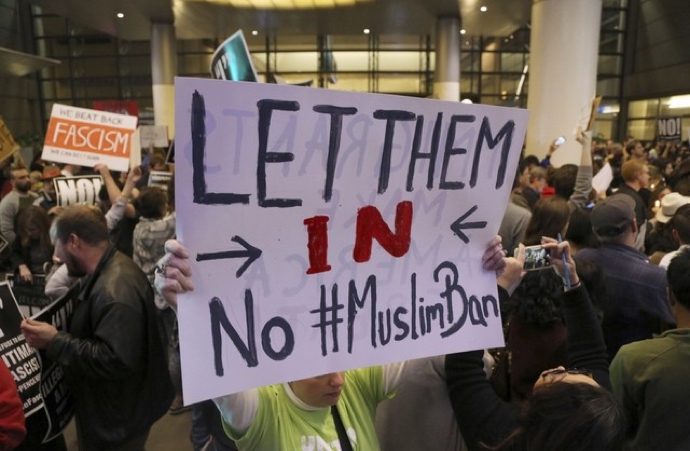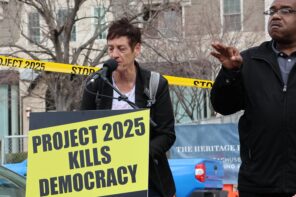1993’s Religious Freedom Restoration Act (RFRA) has been invoked to defend the rights of religious organizations to discriminate in hiring, as in the case of Burwell v. Hobby Lobby, or to legislate against those who would ” force Catholic nuns to pay for abortion-inducing drugs,” as Ted Cruz so memorably put it.
But now, tearing a page from the “religious liberty” playbook, the American Civil Liberties Union has filed a 38-page complaint contending that Trump’s travel ban targeting seven Muslim-majority nations was “motivated by animus toward Muslims and expressly discriminates on the basis of national origin,” violating core constitutional principles—and, crucially, the Religious Freedom Restoration Act.
The federal lawsuit, filed on Tuesday by the ACLU in conjunction with the International Refugee Assistance Project (IRAP) and Jewish international refugee resettlement organization HIAS, marks a new development in the ongoing legal battle over the president’s January 27 order.
“The executive order violates two of our most cherished constitutional protections,” the complaint alleges, including the Fifth Amendment’s promise of equal protection under the law, and “the guarantee that government will not establish, favor, discriminate against, or condemn any religion, and the guarantee of equal protection of the laws.”
Since the Equal Protection argument has already been advanced (and affirmed by several federal judges) in existing lawsuits challenging the executive order, the Establishment argument advanced in this latest suit is both novel and essential. It puts under a microscope the faith-based animosity laid bare by the order, which specifically exempts refugees who are “religious minorities” in the seven Muslim-majority nations targeted by the ban (except for Syrian refugees, who are to be denied U.S. entry across the board, indefinitely). Like much of the language in the executive order, who qualifies as a “religious minority” is poorly defined, and does not appear to include exceptions for Muslims fleeing sectarian violence in Iraq, Iran, Libya, Somalia, Sudan, Syria, or Yemen.
“The executive order violates the Establishment Clause by singling out Muslims for disfavored treatment and granting special preferences to non-Muslims,” the complaint alleges. It also discriminates “between ‘minority religions’ and majority religions, explicitly granting official preference to foreign adherents of minority faiths in the refugee-application process.”
By privileging refugees and immigrants of “minority religions” in the nations targeted, the order effectively requires the U.S. government to track, confirm, and verify the faith practices of every foreign national entering the country, the complaint explains. If this sounds familiar, it should — Trump first proposed a religious or “ideological screening test” for immigrants and refugees back in August 2016, despite promises from former RNC chairman turned White House Chief of Staff Reince Priebus that any immigration orders would not include a religious test.
Using religion as a key factor in determining who may lawfully enter the U.S. is a violation of the federal RFRA, the complaint contends.
The executive order will impose “a special disability on the basis of religious views or religious status, by denying or impeding Muslim Plaintiffs, on account of their religion, from accessing benefits relating to their own or their family members’ immigration status.” Since several of the individual plaintiffs are American citizens or lawful permanent residents, the order infringes on the free religious exercise to which all Americans are guaranteed — and which the Trump-Pence administration claims to value over several other “inalienable rights.”
The complaint systematically documents the overwhelming evidence suggesting that the travel ban was indeed intended to discriminate against Muslims, and calls out specific crafters of the order, most notably senior White House adviser and self-avowed white nationalist Steven K. Bannon. In a section reviewing the “Chaotic and Irregular Implementation of the Order,” the complaint highlights Bannon’s well-documented history of anti-Muslim comments, and the fact that the order was prepared and signed without the standard regulatory review by federal agencies that deal with immigration. The complaint even name-checks Vice President Mike Pence, citing his unsuccessful effort to turn away Syrian refugees slated for resettlement in Indiana last year, when he was governor of the state.
This filing marks the first time HIAS, the world’s oldest refugee resettlement agency, has directly sued the federal government. Although the faith-based organization frequently represents individual clients in asylum cases opposite federal agencies, the religious targeting of Trump’s proposed ban compelled the organization to file suit, HIAS president Mark Hetfield said in a statement announcing the lawsuit.
“We cannot remain silent as Muslim refugees are turned away just for being Muslim, just as we could not stand idly by when the U.S. turned away Jewish refugees fleeing Germany during the 1930s and 40s,” said Hetfield. “Our history and our values, as Jews and as Americans, require us to fight this illegal and immoral new policy with every tool at our disposal — including litigation.”
Given that the Trump-Pence administration has gone out of its way to portray itself as a stalwart defender of “religious liberty,” the blunt allegations in this suit are particularly biting, and have the potential to be especially persuasive. The inclusion of individual plaintiffs who are or will be impacted by the order particularizes the harm at stake, adding emotional and legal weight to the specific impediments faced by the organizations who are party to the suit.
Administration officials have not yet commented publicly on the latest lawsuit, or the religious discrimination complaints it advances.





